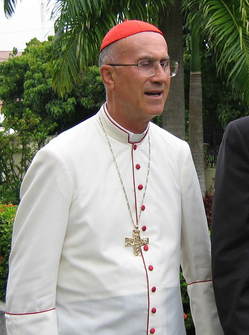 The Cardinal Secretary of State to His Holiness, Tarcisio Bertone was in
The Cardinal Secretary of State to His Holiness, Tarcisio Bertone was in
Bertone was interviewed by Carlo Di Cicco, deputy director of the
One of the relevant questions was on the family and culture why the cardinal gave substantial attention to these topics. What is good to keep before our eyes is the witness that BOTH family and culture can have for work in the Kingdom of God. In answer to this query, Cardinal Bertone said:
Because in reality, the family is the first transmitter of values and culture for the new generations; for children and young people growing up, the family is the transmitter of values. This is a proven fact in the experience of family life, despite all the difficulties that mark the way, not only in
I recall a conference, a debate, that took place here in
In the end we agreed that the family is the first instance of the transmission of values -- and this is also the conviction of the Popes: of John Paul II and, particularly, Pope Benedict, as taken up in the two messages addressed to
It transmits the identity, the family's own identity, and the cultural and spiritual identity of a people.
Then the state is born thanks to the grouping, the communion among families, that is why the state should have the mission to strengthen the identity of a people grounded in its roots, in its origins, which later determine the development of both the political and ecclesial community.
Regarding Culture the cardinal was asked: In the meeting with [people of] the world of culture and education you emphasized the limited success that Mexican culture had during the last century. Is it not a rather harsh judgment for a Church that suffered persecution, including a bloody one?
Cardinal Bertone: It is, in fact, a question of harsh judgment. I literally quoted an author, Gabriel Zaid, who remembers his meeting with a European bishop who asked him: "Is a Catholic culture possible in
When this European bishop, more precisely this Dutch bishop, asked him what could be expected of
"In
This diagnosis is certainly pessimistic: I have taken it up again precisely because there have been incentives, highly significant positive aspects, so that it would be very unjust to stress the negative and subscribe fully to this diagnosis.
Nevertheless, the writer's observation and the bishop's question require an answer; they are stimulating.
That culture is necessary in the work of the Church, and even more so in humanity itself, was affirmed by Pope John Paul II, in his great address in UNESCO, when he cried out: "The future of man depends on culture! The peace of the world depends on the primacy of the Spirit! The peaceful future of humanity depends on love!" Thus he related peace, culture and love.
For the Church, cultural promotion is an innate reality, written in her DNA, in her history: It is an urgent and necessary imperative.
By the very fact that the Gospel is itself creator of culture, the proclamation of the Gospel is cultural creation.
The truth is that the Church in
Despite his young age, he was arrested, and after his capture he was killed. Before dying, he wrote "Long Live Christ the King," which was the cry of Mexican martyrs.
That is why


Leave a comment